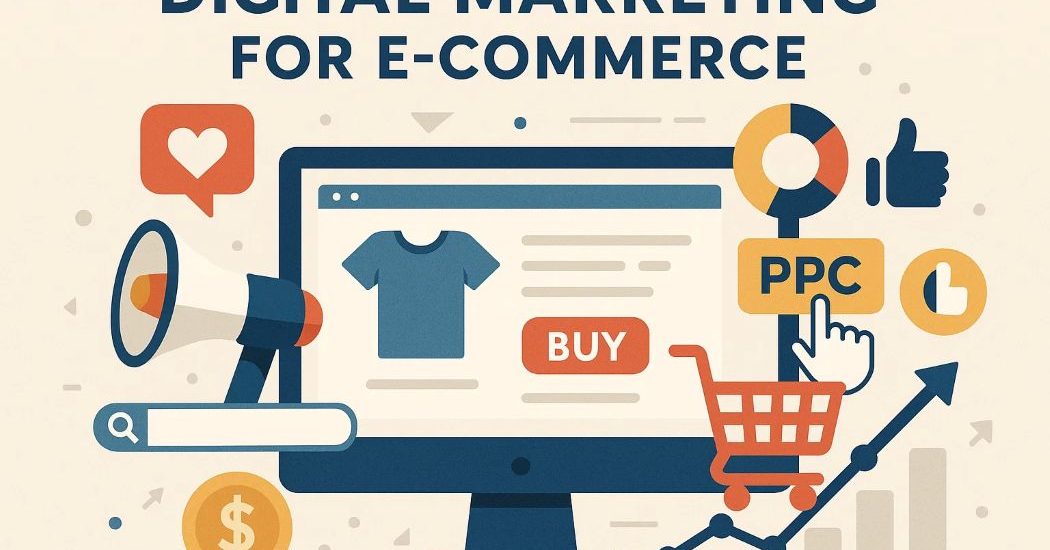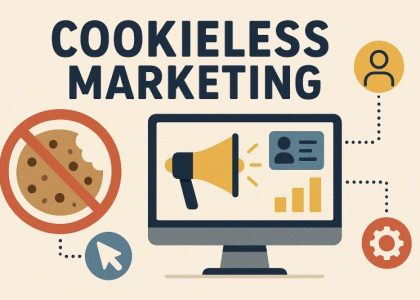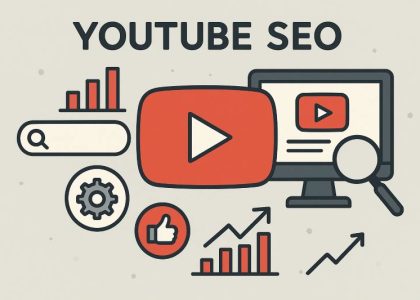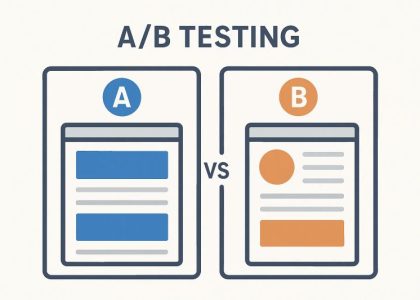Digital marketing is essential for standing out in 2025’s highly competitive e-commerce space. With thousands of online stores fighting for attention, simply launching a website is no longer enough. To consistently attract visitors and drive sales, your brand needs a well-planned and effectively executed digital marketing strategy.
This blog shares proven digital marketing strategies for e-commerce businesses to help you reach the right audience, increase conversions, and grow your online sales—without overspending.
1. Build a Strong SEO Foundation
Search Engine Optimization (SEO) is the foundation of long-term success. When your product pages and blog content rank high on Google, you get free, organic traffic.
Steps to improve your e-commerce SEO:
- Use product-focused keywords (e.g., “organic cotton t-shirts”)
- Create distinct meta titles and descriptions for every page to improve visibility and click-through rates
- Optimize images with alt text and descriptive file names
- Create category pages targeting high-volume search terms
- Start a blog and answer buyer questions with helpful content
Tip: Focus on long-tail keywords—they attract ready-to-buy visitors.
2. Run Highly Targeted Paid Ads
Paid advertising delivers fast results when done right. Instead of spraying ads everywhere, target users based on their behavior, interests, and search intent.
Effective platforms for e-commerce ads:
- Google Ads: Target high-intent shoppers with search and shopping ads
- Facebook & Instagram Ads: Ideal for visual products and interest-based targeting
- Pinterest Ads: Powerful for fashion, decor, and lifestyle brands
- YouTube Ads: Use video to drive awareness and product interest
Expert Tip: Regularly test different ad creatives and landing pages to find what delivers the best results.
3. Use Email Marketing to Nurture and Convert
Email is still one of the most effective channels in e-commerce. It builds customer relationships, recovers lost sales, and boosts repeat purchases through upselling.
Types of email campaigns to use:
- Welcome email series
- Abandoned cart recovery emails
- Product recommendations
- Time-limited promotions
- Post-purchase follow-ups and review requests
Use tools like Mailchimp, Klaviyo, or ConvertKit for automation and segmentation.
4. Leverage Content Marketing and Blogging
Content builds trust. By sharing useful information, tutorials, and product stories, you position your brand as an authority and boost organic traffic.
Content marketing ideas:
- Product buying guides
- “How to use” tutorials
- Behind-the-scenes stories
- Comparison articles
- Customer case studies
Google rewards helpful, relevant content—so be consistent.
5. Maximize Social Media Marketing
Your customers spend hours daily on social platforms. Meet them where they are. Social media drives both engagement and discovery, especially for visual or lifestyle-based products.
Best practices:
- Post consistently (reels, stories, carousels)
- Showcase user-generated content (UGC)
- Run giveaways and contests
- Collaborate with micro-influencers in your niche
- Use social shopping tools (like Instagram Shopping)
Social proof builds trust and boosts conversion rates.
6. Implement Conversion Rate Optimization (CRO)
Getting traffic is just half the battle. If your website doesn’t convert, you’re losing money. Prioritize conversion rate optimization to transform more visitors into paying customers.
Tactics to boost conversions:
- Use clear and compelling CTAs (Buy Now, Shop Today)
- Improve your site’s loading speed using tools like Google PageSpeed Insights
- Simplify the checkout process
- Display product reviews and ratings
- Offer limited-time deals or scarcity-driven promotions
Even small CRO improvements can increase revenue dramatically.
7. Retarget and Remarket Strategically
Most shoppers won’t buy on their first visit. Retargeting ads re-engage visitors by showing personalized offers and timely reminders to return and complete their purchase.
Use platforms like:
- Facebook Pixel
- Google Remarketing Tags
- Dynamic retargeting ads (show products they viewed)
Customize your messaging based on user behavior for better results.
8. Use Influencer Marketing the Right Way
Influencer marketing builds credibility and social proof fast. You don’t need celebrities—micro-influencers often have better engagement.
How to do it smartly:
- Choose influencers aligned with your brand values
- Give them creative freedom
- Track your ROI using custom affiliate links or exclusive discount codes
- Repurpose influencer content across your channels
Influencer content often outperforms brand-created posts.
9. Monitor Performance with Analytics
Track everything you do. Analytics helps you understand what’s working and where to improve.
Key tools to use:
- Google Analytics 4
- Meta Ads Manager
- Hotjar or Microsoft Clarity for behavior tracking
- UTM tracking links for campaigns
Data-driven decisions lead to smarter spending and better results.
10. Stay Ahead with Trends and AI Tools
Digital marketing evolves fast. Stay updated with new tools and trends like:
- AI-powered content tools (e.g., ChatGPT, Jasper)
- Voice search optimization
- Interactive content (quizzes, polls)
- Social commerce via TikTok and Instagram shops
Innovation keeps your brand relevant and competitive.
Conclusion: Digital Marketing Drives E-commerce Success
Digital marketing is the engine that powers ecommerce growth in 2025. By combining SEO, ads, email, content, and analytics, you can build a sustainable system that drives sales, engages your audience, and beats the competition.
Whether you’re starting from scratch or scaling your online store, these strategies will help you connect with your ideal customers—and convert them.





